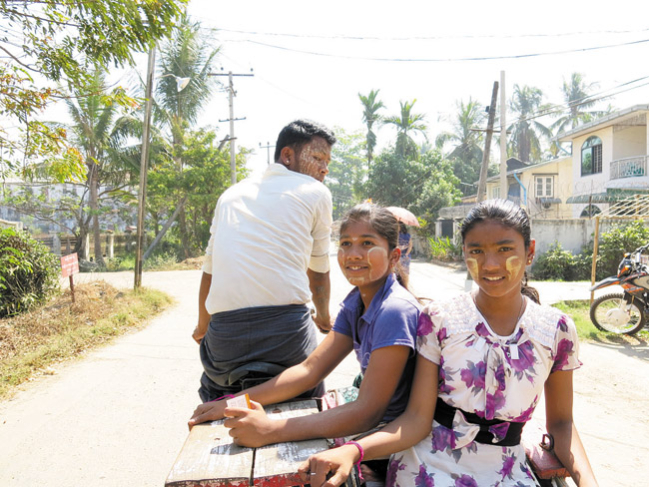Myanmar Boat Ride Turns Into More
It is a country with two names, one historically familiar, the other not so much.
It’s home to 135 different ethnic groups, some currently in a “peace process” with the government. Centuries of foreign sailors along its 400-mile coastline and traders along its timeless overland trails leading to five modern nations have left their genes behind in the mix as well.
It’s a country where the “road to Mandalay” actually is a river, the mighty Irrawaddy, in Kipling’s words “where the flyin’ fishes play.”
In the past 150 years it has been a kingdom, a British colony later occupied by Japan in World War II, and an independent country again that would be taken over in a coup by a military dictatorship whose generals over five decades were quite adept at repressing and massacring their own people by the thousands but so incompetent at administering an economy that since 2011 they’re opening up the country and giving way to a democratic parliament – and tourism.
It may be the only place on Earth where Buddhists attack and kill Muslims.
It is a country with two currencies, the local kyat (pronounced chat) and the preferred U.S. dollar – crisp, clean, unmarked and unfolded bills only. And your plastic and traveler’s checks are probably not going to be accepted most places.
Cars proceed on the right side of the road, but drivers steer from the right side of vehicles.
The time difference from Honolulu, by the way, is seven and a half hours.
This is Myanmar, formerly known as Burma. It is a different place, and as foreign a country as has ever stamped my passport.
I was there for a 10-day stay that included the East-West Center-sponsored International Media Conference in Yangon – attended by more than 400 people from 31 countries. In this and two coming issues I’ll share some of those travels and insights.
To begin, a quite personal tale.
It started, as planned, on a warm Friday evening in Yangon, formerly Rangoon, a city of 4.5 million and growing. I’d arrived earlier that day after a connecting flight from Taipei. Thanks to an e-mailed tip from the head of the Yangon chapter of InterNations, an international ex-pats club, I headed to the Yangon Sailing
Club on massive Lake Inya for chilled beverages at sunset. The club, dating to British colonial times, is open to non-members Friday evenings and is popular with ex-pats of many accents. A Brit working for a Middle Eastern telecom firm recommended several places worth visiting. All sounded nice, but what I really wanted to do on my one full day before the conference was go for a boat ride on the mighty, historic Yangon River. She suggested checking with the front desk of The Strand Hotel across from the wharf. I did just that Saturday morning, walked out of The Strand and my plans – and life, apparently – took a turn.
Outside, I was approached by a pair of street girls, 14 and 15, selling postcards. I bought 20. We chatted a bit, and I was impressed with their English skills, intelligence and personalities, and soon they offered to be my tour guides for the day. Their faces, by the way, were streaked with thanaka, a paste made from ground tree branches, used by most women and some men, as much sunscreen as facial decoration. The younger girl, Nandamin, boasted, “I know all of Yangon – everything.” (Picture a female Artful Dodger from Oliver!, minus the pickpocket skills.) Turns out she lost both parents in Cyclone Nargis in 2008 that killed 138,000, though it’s said the generals either quit counting after that or refused to name a higher figure (and then initially refused aid offered by President George W. Bush, adding to the tragedy). The elder girl, who goes by Christina, lost her father.
I said I wanted a boat ride on the river.
“OK,” Nandamin said, “we’ll show you the other side of the river. That’s where we live.”
Soon we were boarding a double-decker ferry.
Yangon is a major international port, and the busy, brown river teemed with cargo vessels and small, colorful motor launches, with gulls swooping all about.
On the other side, in a chaotic, dusty parking area with trucks, taxis, bicycle rickshaws and women carrying produce in baskets atop their heads, the girls seemed to know everyone, and found two boys, Jeskoo and Lin Lin, 20 and 19, who pedaled rickshaws. Away we went, the girls on one and yers truly on the other.
Down leafy, wooded lanes, we passed houses without electricity or running water, homes doubling as small convenience stores, cafes, mechanic shops or lumber yards. Skinny poi dogs slumbered on the side of the road or licked the insides of a cookie wrapper, looking for a taste of anything. We stopped at what they called the Blue and Gold Pagoda, a spartan Buddhist site, walked around and took turns ringing a big bell.






